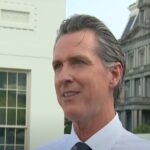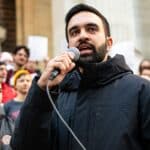


California Gov. Gavin Newsom recently made waves by mocking the process that led to Vice President Kamala Harris’s swift ascent as the Democratic Party's presidential nominee, following President Joe Biden’s withdrawal from the race.
The Washington Examiner reported that Newsom’s comments highlighted concerns about the perceived lack of democracy in the process, as Harris quickly garnered support without a traditional primary election.
Newsom expressed his views during an appearance on the "Pod Save America" podcast, hosted by several former Obama administration staffers.
When questioned about the transition from Biden to Harris, Newsom sarcastically echoed the party’s statements, describing the process as “very open” and “very inclusive.” His remarks, delivered with a clear note of irony, drew laughter from the podcast hosts.
He continued to mock the situation by claiming that the process was “bottom-up,” humorously adding, “That’s what I’ve been told to say.” Newsom’s remarks were seen as a pointed critique of the Democratic Party’s handling of the nomination process, which some have argued sidelined the voters in favor of a rapid endorsement.
The method of quickly securing Harris’s nomination was referred to as a “blitz primary” by Jon Favreau, Obama’s former director of speechwriting.
This term reflects the strategy used by some Democrats to swiftly replace Biden, who had been the presumptive nominee until his unexpected announcement to step aside.
Harris rapidly gained endorsements from prominent Democratic figures, further solidifying her position as the party's nominee without the need for a broader primary election.
This approach has faced criticism for being undemocratic. Many within the party and outside observers have expressed concerns that the process bypassed the traditional primary system, which typically allows for a more extended and inclusive selection process. Harris’s quick ascent raised questions about whether voters were adequately represented in the decision-making process.
Before Harris was solidified as the nominee, there was speculation about other potential candidates who could step in if Biden were to step aside.
Names like Michigan Gov. Gretchen Whitmer, Pennsylvania Gov. Josh Shapiro, and West Virginia Sen. Joe Manchin were floated as possible alternatives. However, none of these figures gained significant traction, leaving Harris as the clear frontrunner following Biden’s endorsement.
Despite the brief consideration of these other candidates, Harris’s nomination was seen as a foregone conclusion once the process began.
The swift nature of the nomination left little room for challengers, reinforcing the perception that the decision was made by party elites rather than through a more democratic process.
The Trump campaign quickly seized on Newsom’s remarks and the controversy surrounding Harris’s nomination. In a statement, Trump campaign spokesman Steven Cheung described the process as an “un-Democratic coup” and criticized Harris for not earning the nomination through a traditional primary.
“Comrade Kamala didn’t receive a single vote in the Democrat primary, yet she’s been anointed by the Democrat powerbrokers against the will of the voters,” Cheung said, drawing a stark contrast with Trump’s own path to the nomination, which he claimed was earned through a competitive primary process.
Cheung’s comments reflect a broader narrative pushed by the Trump campaign, which has sought to portray the Democratic Party as out of touch with its voters and dominated by elites.
By framing Harris’s nomination as undemocratic, the campaign aimed to undermine her legitimacy as the party’s standard-bearer in the upcoming election.
Despite the controversy, Harris celebrated her nomination at the Democratic National Convention (DNC) this week.
The event marked a significant milestone for Harris, who became the first woman of color to lead a major party’s ticket for the presidency. Harris’s acceptance of the nomination was a historic moment, even as questions lingered about the process that brought her to that point.
Gov. Newsom was also present at the DNC, where he briefly spoke while announcing his state’s delegates’ votes for president. Newsom’s participation at the convention underscored his continued influence within the party, even as he remains a potential candidate for the 2028 presidential election.



